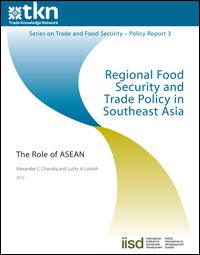| 来源类型 | Paper
|
| 规范类型 | 论文
|
| Regional Food Security and Trade Policy in Southeast Asia: The Role of ASEAN |
| Alexander C. Chandra; Lucky A. Lontoh
|
| 发表日期 | 2010-06
|
| 出版者 | IISD
|
| 出版年 | 2010
|
| 页码 | 29
|
| 语种 | 英语
|
| 概述 | The achievement of food security and the promotion of open trade are two of the key challenges the Association of Southeast Asian Nations (ASEAN... |
| 摘要 |
The achievement of food security and the promotion of open trade are two of the key challenges the Association of Southeast Asian Nations (ASEAN) faces. The 2007/08 food crisis had sparked wider debates about the relationship between the two variables, and the extent to which the existing trade policies of the Association are detrimental to the promotion of food security in the region, and vice-versa. While the global food crisis did not necessarily hamper regional trade, the ways in which individual nations responded to the crisis were not only detrimental to the promotion of regional food trade, but also to the overall open economic commitment of the region vis-à-vis the world market. Key findings: There is still a major discrepancy between the aspiration of ASEAN to remain as an open economic regional grouping and its member countries' insistence on maintaining the protection of their food markets; The 2007/08 global food crisis proved to be a strong test case for ASEAN solidarity with key rice-producing countries in the region choosing to supply the global food needs at the expense of fulfilling the need of food supplies in other ASEAN member countries; Another concern that jeopardized ASEAN's overall solidarity was the initiative by some key rice-exporting nations to set up the so-called Organization for Rice Exporting Countries (OREC). While it is not clear as to whether OREC would turn into an agricultural cartel similar to that of Organization for Petroleum Exporting Countries (OPEC), the idea was nevertheless seen as a political threat that could potentially hamper further cooperation in the region. As the grouping integrates further and moves towards its plan to establish an ASEAN Community in 2015, there is an impending need for each member country to review its food security and trade priorities. Despite the diverse capacity of ASEAN member countries to produce food, food insecurity is a regional problem that is best tackled with a regional approach.
Key recommendations: Implement national food security policies that are in line with the spirit of ASEAN regionalism; Make use of, improve and expand the existing food security mechanisms in ASEAN and beyond, particularly some of the more recent initiatives, such as the ASEAN Integrated Food Security (AIFS) and its corresponding Strategic Plan of Action for Food Security (SPA-FS), as well as others within the ASEAN plus Three framework, including the ASEAN Food Security Information System (AFSIS) and the East Asian Emergency Rice Reserve (EAERR); Coordinate better to reduce trade and food security policy discrepancies at both national and regional levels; and Put relevant social safety nets in place and work with relevant non-state stakeholders to minimize the adverse impacts of open food trade regimes.
|
| URL | https://www.iisd.org/library/regional-food-security-and-trade-policy-southeast-asia-role-asean
|
| 来源智库 | International Institute for Sustainable Development (Canada)
|
| 资源类型 | 智库出版物
|
| 条目标识符 | http://119.78.100.153/handle/2XGU8XDN/57073
|
推荐引用方式
GB/T 7714 |
Alexander C. Chandra,Lucky A. Lontoh. Regional Food Security and Trade Policy in Southeast Asia: The Role of ASEAN. 2010.
|
|
文件名:
|
regional_food_trade_asean.jpg
|
|
格式:
|
JPEG
|

|
文件名:
|
regional_food_trade_asean.pdf
|
|
格式:
|
Adobe PDF
|
除非特别说明,本系统中所有内容都受版权保护,并保留所有权利。